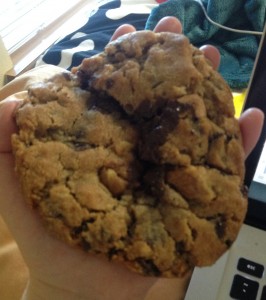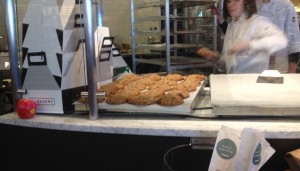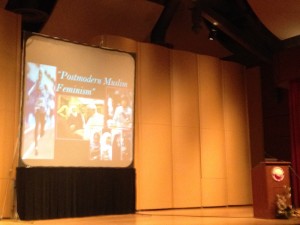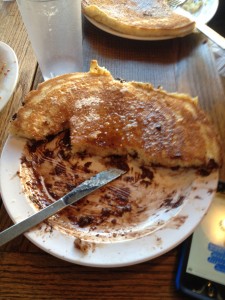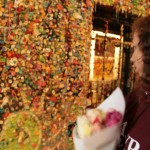They’re here. I thought, you know: cookies are so different, there are so many types you’ll never be able to say that one is the best, etcetera, etcetera. I was wrong.
You guys think that I am kidding. I am not kidding.
At the Metropolitan Market on Proctor Street, the first thing you see when you walk into the store is The Cookie. (The capitalization is important: that’s what it is actually called. The Met knows what it’s about.) The Cookie is—well, how would one describe The Cookie.
I asked:
“Flawless.”
“It is deliciously gooey in the middle, but the outside has an amazingly satisfying crunch.”
“I heard the recipe is insured for $200,000.”
“One time, Gordon Ramsay ate one, and he thought it was the best cookie in the world.”
“One time, I used my entire paycheck to buy every cookie they had at the Met. It was awesome.”
(These are all 100% accurate things that other people have definitely said.)
On paper, The Cookie can be described as a giant chocolate chip cookie with walnuts. But it is so much more than that.
Each bite begins with a crunch that dissolves into layers of pure melted chocolate wrapped around streaks of cookie dough and thick clumps of walnuts. Chocolate streaks your fingers when you eat it. The smell—which is the purest smell chocolate chip cookie smell in the world—permeates through any room it is placed in. You walk into a room with The Cookie in it, and, like Pavlov’s dog, you immediately start salivating. It is that good.
A couple of my friends and I walked to the Met today. The Met is just close enough to the school to make it easy to get there, but just far enough that going every single day becomes a hassle. We entered—and if there was any question about what we were going to get, the people working there were loading cookies, fresh from the oven, onto the display sheet.
“Dear god,” my friend said.
“These are the best [CENSORED] [CENSORED] cookies in the world,” my friend said.
We loaded up on cookies (we bought other necessities like face wash and peanut butter across the street at Safeway, where it is mildly cheaper if you have a Safeway card). On the walk back, my friends nibbled on their cookies.
“I’ve already finished mine,” my friend announced, sheepishly.
“This might be my lunch,” my other friend said.
Chocolate smeared around their lips and fingers. We walked under the pale yellow sun. I adjusted my sunglasses and thought of the cookies burning a hole in my bag. The Cookies, I should say. I was going to go back to my room and eat them, and it was going to be the greatest thing ever.

